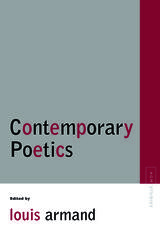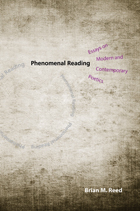2 books about Contemporary Poetics

Contemporary Poetics
Louis Armand
Northwestern University Press, 2007
Exploring the boundaries of one of the most contested fields of literary study—a field that in fact shares territory with philology, aesthetics, cultural theory, philosophy, and even cybernetics—this volume gathers a body of critical writings that, taken together, broadly delineate a possible poetics of the contemporary. In these essays, the most interesting and distinguished theorists in the field renegotiate the contours of what might constitute "contemporary poetics," ranging from the historical advent of concrete poetry to the current technopoetics of cyberspace. Concerned with a poetics that extends beyond our own time, as a mere marker of present-day literary activity, their work addresses the limits of a writing "practice"—beginning with Stéphane Mallarmé in the late nineteenth century—that engages concretely with what it means to be contemporary.
Charles Bernstein's Swiftian satire of generative poetics and the textual apparatus, together with Marjorie Perloff's critical-historical treatment of "writing after" Bernstein and other proponents of language poetry, provides an itinerary of contemporary poetics in terms of both theory and practice. The other essays consider "precursors," recognizable figures within the histories or prehistories of contemporary poetics, from Kafka and Joyce to Wallace Stevens and Kathy Acker; "conjunctions," in which more strictly theoretical and poetical texts enact a concerted engagement with rhetoric, prosody, and the vicissitudes of "intelligibility"; "cursors," which points to the open possibilities of invention, from Augusto de Campos's "concrete poetics" to the "codework" of Alan Sondheim; and "transpositions," defining the limits of poetic invention by way of technology.
Charles Bernstein's Swiftian satire of generative poetics and the textual apparatus, together with Marjorie Perloff's critical-historical treatment of "writing after" Bernstein and other proponents of language poetry, provides an itinerary of contemporary poetics in terms of both theory and practice. The other essays consider "precursors," recognizable figures within the histories or prehistories of contemporary poetics, from Kafka and Joyce to Wallace Stevens and Kathy Acker; "conjunctions," in which more strictly theoretical and poetical texts enact a concerted engagement with rhetoric, prosody, and the vicissitudes of "intelligibility"; "cursors," which points to the open possibilities of invention, from Augusto de Campos's "concrete poetics" to the "codework" of Alan Sondheim; and "transpositions," defining the limits of poetic invention by way of technology.
[more]

Phenomenal Reading
Essays on Modern and Contemporary Poetics
Brian M. Reed
University of Alabama Press, 2012
Normal0falsefalsefalseMicrosoftInternetExplorer4
The essays in Phenomenal Reading entice readers to cross accepted barriers, and highlight the work of poets who challenge language-as-usual in academia and the culture at large.
Phenomenal Reading is comprised of essays that are central to how best to read poetry. This book examines individually and collectively poets widely recognized as formal and linguistic innovators. Why do their words appear in unconventional orders? What end do these arrangements serve? Why are they striking? Brian Reed focuses on poetic form as a persistent puzzle, using historical fact and the views of other key critics to clarify how particular literary works are constructed and how those constructions lead to specific effects.
Understanding that explication and contextualization do not always sufficiently harness the power of poetry, Reed pursues phenomenological methods that take into account each reader’s unique perception of the world. This collection of twelve essays values narrative as a tool for conveying the intricacy, contingency, and richness of poetic experience.
[more]
READERS
Browse our collection.
PUBLISHERS
See BiblioVault's publisher services.
STUDENT SERVICES
Files for college accessibility offices.
UChicago Accessibility Resources
home | accessibility | search | about | contact us
BiblioVault ® 2001 - 2025
The University of Chicago Press









